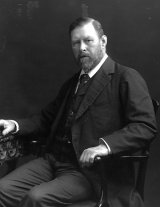Dracula Page #24
Dracula is an 1897 Gothic horror novel by Irish author Bram Stoker. It introduced Count Dracula, and established many conventions of subsequent vampire fantasy. The novel tells the story of Dracula's attempt to move from Transylvania to England so that he may find new blood and spread the undead curse, and of the battle between Dracula and a small group of men and a woman led by Professor Abraham Van Helsing.
* * * * * 27 July.--No news from Jonathan. I am getting quite uneasy about him, though why I should I do not know; but I do wish that he would write, if it were only a single line. Lucy walks more than ever, and each night I am awakened by her moving about the room. Fortunately, the weather is so hot that she cannot get cold; but still the anxiety and the perpetually being wakened is beginning to tell on me, and I am getting nervous and wakeful myself. Thank God, Lucy's health keeps up. Mr. Holmwood has been suddenly called to Ring to see his father, who has been taken seriously ill. Lucy frets at the postponement of seeing him, but it does not touch her looks; she is a trifle stouter, and her cheeks are a lovely rose-pink. She has lost that anæmic look which she had. I pray it will all last. * * * * * 3 August.--Another week gone, and no news from Jonathan, not even to Mr. Hawkins, from whom I have heard. Oh, I do hope he is not ill. He surely would have written. I look at that last letter of his, but somehow it does not satisfy me. It does not read like him, and yet it is his writing. There is no mistake of that. Lucy has not walked much in her sleep the last week, but there is an odd concentration about her which I do not understand; even in her sleep she seems to be watching me. She tries the door, and finding it locked, goes about the room searching for the key. 6 August.--Another three days, and no news. This suspense is getting dreadful. If I only knew where to write to or where to go to, I should feel easier; but no one has heard a word of Jonathan since that last letter. I must only pray to God for patience. Lucy is more excitable than ever, but is otherwise well. Last night was very threatening, and the fishermen say that we are in for a storm. I must try to watch it and learn the weather signs. To-day is a grey day, and the sun as I write is hidden in thick clouds, high over Kettleness. Everything is grey--except the green grass, which seems like emerald amongst it; grey earthy rock; grey clouds, tinged with the sunburst at the far edge, hang over the grey sea, into which the sand-points stretch like grey fingers. The sea is tumbling in over the shallows and the sandy flats with a roar, muffled in the sea-mists drifting inland. The horizon is lost in a grey mist. All is vastness; the clouds are piled up like giant rocks, and there is a "brool" over the sea that sounds like some presage of doom. Dark figures are on the beach here and there, sometimes half shrouded in the mist, and seem "men like trees walking." The fishing-boats are racing for home, and rise and dip in the ground swell as they sweep into the harbour, bending to the scuppers. Here comes old Mr. Swales. He is making straight for me, and I can see, by the way he lifts his hat, that he wants to talk.... I have been quite touched by the change in the poor old man. When he sat down beside me, he said in a very gentle way:-- "I want to say something to you, miss." I could see he was not at ease, so I took his poor old wrinkled hand in mine and asked him to speak fully; so he said, leaving his hand in mine:-- "I'm afraid, my deary, that I must have shocked you by all the wicked things I've been sayin' about the dead, and such like, for weeks past; but I didn't mean them, and I want ye to remember that when I'm gone. We aud folks that be daffled, and with one foot abaft the krok-hooal, don't altogether like to think of it, and we don't want to feel scart of it; an' that's why I've took to makin' light of it, so that I'd cheer up my own heart a bit. But, Lord love ye, miss, I ain't afraid of dyin', not a bit; only I don't want to die if I can help it. My time must be nigh at hand now, for I be aud, and a hundred years is too much for any man to expect; and I'm so nigh it that the Aud Man is already whettin' his scythe. Ye see, I can't get out o' the habit of caffin' about it all at once; the chafts will wag as they be used to. Some day soon the Angel of Death will sound his trumpet for me. But don't ye dooal an' greet, my deary!"--for he saw that I was crying--"if he should come this very night I'd not refuse to answer his call. For life be, after all, only a waitin' for somethin' else than what we're doin'; and death be all that we can rightly depend on. But I'm content, for it's comin' to me, my deary, and comin' quick. It may be comin' while we be lookin' and wonderin'. Maybe it's in that wind out over the sea that's bringin' with it loss and wreck, and sore distress, and sad hearts. Look! look!" he cried suddenly. "There's something in that wind and in the hoast beyont that sounds, and looks, and tastes, and smells like death. It's in the air; I feel it comin'. Lord, make me answer cheerful when my call comes!" He held up his arms devoutly, and raised his hat. His mouth moved as though he were praying. After a few minutes' silence, he got up, shook hands with me, and blessed me, and said good-bye, and hobbled off. It all touched me, and upset me very much. I was glad when the coastguard came along, with his spy-glass under his arm. He stopped to talk with me, as he always does, but all the time kept looking at a strange ship. "I can't make her out," he said; "she's a Russian, by the look of her; but she's knocking about in the queerest way. She doesn't know her mind a bit; she seems to see the storm coming, but can't decide whether to run up north in the open, or to put in here. Look there again! She is steered mighty strangely, for she doesn't mind the hand on the wheel; changes about with every puff of wind. We'll hear more of her before this time to-morrow."
Translation
Translate and read this book in other languages:
Select another language:
- - Select -
- 简体中文 (Chinese - Simplified)
- 繁體中文 (Chinese - Traditional)
- Español (Spanish)
- Esperanto (Esperanto)
- 日本語 (Japanese)
- Português (Portuguese)
- Deutsch (German)
- العربية (Arabic)
- Français (French)
- Русский (Russian)
- ಕನ್ನಡ (Kannada)
- 한국어 (Korean)
- עברית (Hebrew)
- Gaeilge (Irish)
- Українська (Ukrainian)
- اردو (Urdu)
- Magyar (Hungarian)
- मानक हिन्दी (Hindi)
- Indonesia (Indonesian)
- Italiano (Italian)
- தமிழ் (Tamil)
- Türkçe (Turkish)
- తెలుగు (Telugu)
- ภาษาไทย (Thai)
- Tiếng Việt (Vietnamese)
- Čeština (Czech)
- Polski (Polish)
- Bahasa Indonesia (Indonesian)
- Românește (Romanian)
- Nederlands (Dutch)
- Ελληνικά (Greek)
- Latinum (Latin)
- Svenska (Swedish)
- Dansk (Danish)
- Suomi (Finnish)
- فارسی (Persian)
- ייִדיש (Yiddish)
- հայերեն (Armenian)
- Norsk (Norwegian)
- English (English)
Citation
Use the citation below to add this book to your bibliography:
Style:MLAChicagoAPA
"Dracula Books." Literature.com. STANDS4 LLC, 2024. Web. 25 Nov. 2024. <https://www.literature.com/book/dracula_10>.




Discuss this Dracula book with the community:
Report Comment
We're doing our best to make sure our content is useful, accurate and safe.
If by any chance you spot an inappropriate comment while navigating through our website please use this form to let us know, and we'll take care of it shortly.
Attachment
You need to be logged in to favorite.
Log In